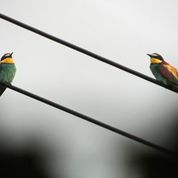
The National Trust has announced that there is a pair of Bee-eaters (the only bird with three consecutive ‘e’s in its name? Probably not, though I can’t think of another) nesting on the Isle of Wight.
As someone who spent six summers studying bee-eaters in the Camargue, I must say I am delighted. The birds have been seen carrying food down their nesting tunnel so this indicates that the young have hatched – or at least the first of them as they are asynchronous hatchers – one egg a day will hatch on average (I told you I studied them!).
What the team on 24-hour round the clock watch can expect to see is that the parent birds, pretty equally, will bring small prey – guess what! – mostly bees – to the chicks at first and then will be bringing more and more larger prey with dragonflies making up a large proportion of them (depending, of course, on what’s about).
In France, we always knew when the rice harvest had begun because the Bee-eaters started bringing Great Green Bush-crickets (or Great Green Googly insects as we called them) Tettigonia viridissima to the nestlings then.
 What does this Bee-eater, one of the pair concerned, have in its beak do you think? Is it a very large fly? Someone will tell me, I’m sure.
What does this Bee-eater, one of the pair concerned, have in its beak do you think? Is it a very large fly? Someone will tell me, I’m sure.
This bird looks like the male – lots of orange on the wing – the females have more green but there is quite a lot of overlap (I told you, I used to study them).
Bee-eaters have nested successfully in the UK only twice before – this isn’t yet the third one. Those successful nests were in Sussex in 1955, and in Co Durham (rather surprisingly) in 2002.
There was an unsuccessful nesting attempt in Herefordshire, predated by foxes, in 2005.
Have you seen a Bee-eater? If so, I bet you said ‘They are smaller than I expected’ when you did see them – didn’t you?
As a Bee-eater lover I used to smile every time the afternoon play on BBC Radio 4 played idyllic rural bird noises in the background, as one often heard the pruit-pruit of a Bee-eater – this summer it’s true!
[registration_form]
It’s true, the bee-eater is a common and widespread bird in Radio 4-land!
I saw them inland of the Costa de la Luz, Andalucia. I remember it well because at the time my then 13 year old daughter was playing dead lying on the ground trying to entice the griffon vultures nearer for a better look. That ploy doesn’t work by the way!
bimbling – I bet it does! She just didn’t do it for long enough. That’s what I’d have told her anyway.
Mallee Emuwren
Martin – I’m not surprised that it’s a Birdlife staffer that finds one! I did google it to check it’s a real bird – quite a cute little one, ain’t it?
How many more have you got?
Apart from all the bee-eaters that’s the only one I think.
Bizarrely, when I was a teenager it was random chat about bee-eaters with a certain female academic who worked on them in the south of France that made me want to study evolutionary biology……
Some of us Island folk have been keeping an eye on these, we are almost Mediterranean down here, a big sigh of relief when they started flying in with food. Didn’t know they were a favourite of yours.
I went to see the Herefordshire birds; such a shame when they were predated. Let’s hope these ones fare better.
Great news, I’ve seen one very briefly in the UK but my lasting memory is of several thousand passing overhead in a little over an hour in September 2006 in Bulgaria. Utterly spell binding, nearly as good as the flyby male Pallid Harrier!
Is Blue-cheeked Bee-eater the bird with the most e’s in its name?
Details here of attempted breeding of bee-eater in Musselburgh, Scotland back in 1920. Back in the days when folk though they might eat bread and when the death of one resulted in a police enquiry!
http://www.andrewsi.freeserve.co.uk/beeeater1920.htm
Brian
Can it be long before a self-styled “countryman” blames them for the decline in bees, and demands they be “controlled to restore the natural balance”?
Great minds think alike, Andrew. And they’ll try and implicate Buzzards somehow as well.
If the picture in today’s Guardian is the same bird, the prey looks like a small dragonfly – common darter?
Lyn – I’ve seen a dragonfly picture but this looks chunkier than that. Might be right though! thanks